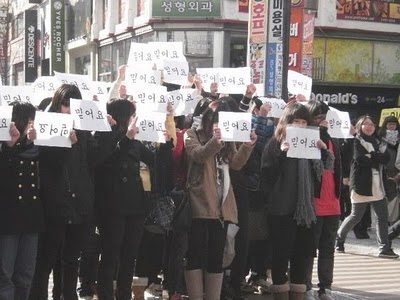(Missed Part 1 last week? Check it out HERE.)
2. THE MESSAGE.
At the heart of things, Their Rooms is a minialbum. Call it a “music essay” or what-have-you, but if I see a CD with six songs on it being sold for a ridiculous price, then I’mma call it a minialbum.
Ridiculous price indeed – because this thing cost me $40USD. WHICH IS OUTRAGEOUS. The album is, admittedly beautifully packaged – but at the end of the day, it’s just a daily planner with a few poly inserts and a CD stuck in the back cover. It’s not worth 40 bucks, but let’s face it: just about everything that JYJ’s produced since The Beginning has been horridly overpriced.
And for good reason – when you’re working without the financial support of a giant corporation for the first time, you’re gonna need money to keep going. The Beginning was released a total of four times: the CD/digital download on October 14th, the ‘luxury edition’ on October 18th, the United States digital release on November 16th, and a re-released version in Korea on November 22nd. The prices for each of these separate editions ranged from $18USD to $50USD. I don’t care whether you package a poster, a photobook, or a pet rabbit with it – fifty dollars for a ten-track CD is ludicrous. Nonetheless, The Beginning was one of the top-selling albums in Korea last year. Of course, it’s not a new phenomenon to see fans spending inordinate amounts of money for the sake of their idols, and JYJ knows this fact full well. You’d be a fool to be in the K-pop industry and not inflate the prices of your products because a) people are going to buy it anyway, and b) how else are you going to compensate for all the money lost to illegal downloading? Inflated prices are just a fact of life at this point, and as a fan, you accept it or move on.
But regardless, it saddens me when I see artists taking advantage of it.
Last autumn, JYJ played shows in New York, Los Angeles, and Las Vegas free of charge due to a discrepancy in obtaining their working visas. As a result, the trio had to pay off the concert expenses out-of-pocket. Enter Their Rooms, Our Story and Jaejoong’s Intermodulation photobook.
In a sense, the sale of Intermodulation makes me laugh more than anything else because this photobook has little to no artistic merit as a photographic work…but boy, does it feature a lot of nekkid Jaejoong. Maybe it’s because I still have the mentality of a kindergartener, but I’ve never found it sexy whenever my favorite idols decide to disrobe in public. It seems that I’m in the minority, though – because Cassies were all over this Intermodulation thing when it came out.
Yes, people paid $140 for pictures of naked Jaejoong covered in bubbles.
It’s clear that Intermodulation was sold to appeal directly to the fans – because, I mean, if I weren’t a Jaejoong fan, I would not pay $140 for his pictures, no matter how hot he is. But judging from comments posted on blogs that featured pictures from Intermodulation, it appears that a ton of fans were interested in buying the photobook. Regardless of whether or not the fans actually bought the photobook, such reactions show the nature of fans and their wallets. In this sense, Intermodulation achieved its desired effect: JYJ sold an overpriced product, fans bought it, JYJ makes fast money. There’s something that’s a bit offputting about selling fan-fodder photos to make a quick buck, but if that’s how JYJ rolls, then I shouldn’t judge.
What bothered me more, though, was that JYJ used this exact same business model to sell Their Rooms. One of the biggest criticisms of Their Rooms is that it’s this half-hour long emotional sob story about JYJ’s lawsuit struggles. As musicians, it’s natural for them to write music about that stuff – it’s how musicians communicate, after all. But it’s one thing to write music about your personal struggles, and another thing to sell it.
Idol fandom is unique because the relationship between the idol and the fan isn’t simply defined by a fan’s love of the music – it’s defined by a fan’s love of the person making the music. Such a relationship is actually quite dangerous, because at the heart of things, fans are nothing more than consumers of a product. You fall in love with an artist whom you’ll probably never meet and never talk to. So how can you show your love? You buy their stuff. The relationship between a fan and an idol is bought by the dollar, because there’s no other available vessel of communication. The idol industry is designed so that fans become convinced that they have some sort of personal relationship with their favorite idols, but this relationship is oftentimes one-sided. While fans are hollering “Oppa, I love you!” at concerts, the artists are still bowing courteously to their fans and using honorific speech whilst asking them to support their newest song.
It’s diabolical, really, once you think about how entertainment companies capitalize on fans’ emotions. So one might expect better from JYJ now that they’ve left the idol-breeding machine that is SM Entertainment and moved onto becoming ‘real musicians.’ But the thing about JYJ is that they will always be regarded as idols in the public eye because of their connection with DBSK, and until the DBSK legacy becomes a thing of the past, JYJ’s fanbase will be an idol-centric fanbase. Until the members of JYJ become old and grey (which, by idol standards, probably means sometime around the age of 35), their fans will continue to hold neon signs at concerts and wave glowsticks in the air and mob them in public places and declare their love for them with high pitched screams.
But what’s even more dangerous about the JYJ fandom is the added bonus that these fans feel like they’ve “struggled” alongside JYJ during the lawsuit period, and therefore feel that they’re “closer” to the members on a personal level. But in reality, a JYJ fan’s status as a JYJ fan really hasn’t changed. A JYJ fan is still a customer of JYJ products, regardless of how much she’s deluded herself into thinking that her relationship with JYJ is anything deeper than that. This extreme emotional investment leaves fans very vulnerable to manipulation.
I attended JYJ’s New York showcase, and as much as I enjoyed their performance, the one thing that really rubbed me the wrong way about it was how the production and management staff put such a huge emphasis on the importance of the fans – how Cassiopeia was the best fanclub in the world, how JYJ was doing the entire US tour for free because of the fans, how the fans were the sole reason why JYJ existed. There’s probably some truth in all that, but if you look beyond the rhetoric, it really just looks like JYJ’s sucking up to the fans in a highly emotional manner, and targeting that sensitive spot that turns an ordinary fan into a lovestruck fan. Of course JYJ can’t exist without fans – because the fans are the ones with money, and after all – money makes love go round.
It really sounds as if I’m accusing JYJ of being golddiggers – and I’m trying to stay away from that, but with the release of Their Rooms, I can’t help but think otherwise. When I read the lyrics to the songs in Their Rooms for the first time, the DBSK/JYJ fangirl within me told me, “You need to buy this album; otherwise you’ll be a bad fan.” As a fan, I didn’t see Their Rooms for its musical value – I saw it for its political and emotional value. When I reviewed Their Rooms last week, I felt a twinge of guilt as I critiqued the music from an objective point of view because I felt that by pulling apart their music and evaluating it, I was doing the same thing to the JYJ members themselves. And there’s clearly something wrong if I feel guilty about critiquing music because I’m afraid of hurting the feelings of three men whom I’ll probably never meet.
Their Rooms wasn’t produced and released because JYJ wanted to put out good music. Their Rooms is a music essay – it’s JYJ’s emotional outpouring through their lyrics, their music, their photos, the essays they wrote in the liner notes. It’s JYJ showing their humanity and shedding their public image just as easily as Jaejoong shed his clothes for that Intermodulation photoshoot. And, just like the fans ate up pictures of Jaejoong’s naked body, they also ate up pictures of JYJ’s naked souls.
In a way, I pity JYJ for having to succumb to such measures in order to pay off the debt of their US tour, but considering their dire situation, I’m not sure if they had much of a choice. Nonetheless, there’s clearly something wrong with the idol industry if the only way for an idol to make a lot of money in a short amount of time is by manipulating his fans’ emotions. But this also goes to say that there’s something wrong with idol fan culture if it can be manipulated this easily.
Much of the scary, collectivist nature of K-pop fandom is rooted in Korean societal nuances, which explains phenomena ranging from the 2002 World Cup frenzy in Seoul to the idea of sasaeng fans. But what’s surprising is that despite all this, international fans are oftentimes guilty of the most extreme actions. We’re the ones paying ridiculous shipping and import fees for K-pop products. We’re the ones trying to learn Korean on our own in the hopes of one day communicating with our idols. We’re the ones who cause idol stars to get physically injured due to fan mobs at airports. We’re the ones with “Always Keep The Faith” as our forum signatures and Twitter icons. We’re the ones who, like me, wait outside of the Hammerstein Theatre in New York City for seven hours in the blistering November cold to see an hour-long JYJ concert. Arguably, we’re the ones who buy into this idol nonsense the most. And until entertainment companies find a way to keep the idol industry alive without manipulating fans, we’re also the ones with the power to wake up and stop this cycle.
Both Intermodulation and Their Rooms served as fan fodder, albeit in different ways. Intermodulation attempted to gain revenue via fans’ hormones. Their Rooms attempted to gain revenue via fans’ emotions. It’s wrong to manipulate the people who love you, but it’s also wrong for a victim to remain passive when she knows she’s being taken advantage of. I received a bit of flack for my review on DBSK’s Keep Your Head Down, and many people accused me of lying when I said that I was, in fact, more of a HoMin fan than a JYJ fan. But the most important thing about being a fan, I’ve noticed, is having your head on straight. It doesn’t just mean that you have to evaluate your favorite idols’ works through an objective point of view. It means that you have to be especially critical of your favorite idols, because it’s your actions as a fan that will change things for the better. Criticism becomes ten times more effective when it’s coming from someone who actually cares. When I saw things that were wrong about HoMin’s promotion efforts, it was my duty as a fan to point them out. Now, as JYJ fans see the things that are wrong with JYJ’s attempts to cozy up to fans’ emotions, it’s the fans’ duty to stand up and say that this kind of manipulation is unacceptable and will not receive their monetary support. And that begins with telling your idol that your relationship is strictly business.






